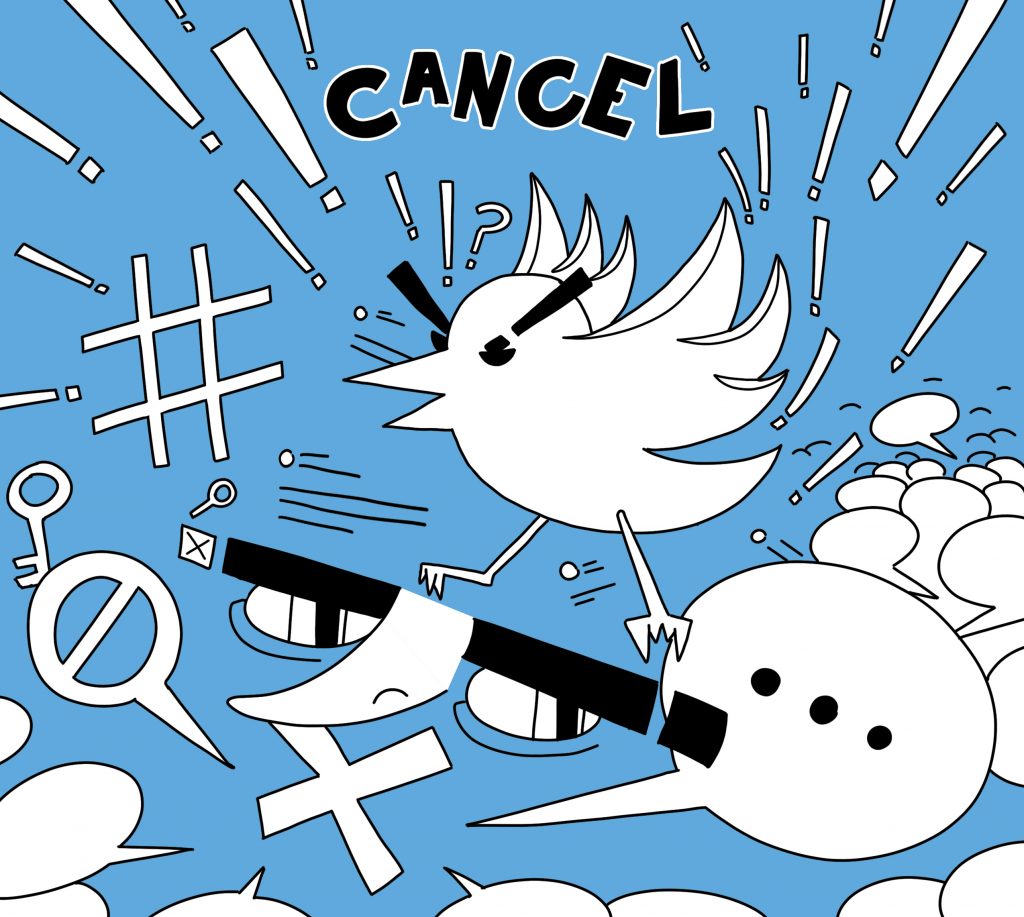
It used to be that masses of people congregated in a public square to witness the demise of an individual. The blade sat quietly, then quickly descended onto the neck of the accused. Then it was wiped clean and the next perpetrator was put in place.
A similar punishment happens currently, though less grotesque and murderous in nature. Today, it takes place online in the domains of social media. All varieties of crimes are now tried in the courts of Twitter. From the despicable actions of rapists like Harvey Weinstein and Bill Cosby, all the way down to the “problematic” tweets of semi-famous public figures.
While the court of public opinion is nothing new, the way in which it is employed has changed drastically. Gone are the days of week-long news cycles and word-of-mouth celebrity gossip. Now, news and information are quickly disseminated, accessed and shared within the span of a few minutes.
This presents a precarious situation to the average Joe on Twitter. Scandalous news spreads like wildfire, before the news is even given a chance to develop. Joe is in an era of clickbait journalism, where news breaks with vague or little information and speculation is written right into stories.
It doesn’t help that the internet serves as an amplifier for mob mentality. Dissenting opinions are blocked, downvoted and algorithmically filtered out of view. The result is a hysterical mob moving quickly to tarnish the reputation of a person based on little more than a news blurb or a decade-old tweet.
So, what is Joe to do? Well, he’s supposed to retweet, share, speculate some more and then bring the axe down on that sad sack’s career and personal life.
Wait. Reel it back in for a second.
Recall the squares of 18th century France, and the heads rolling down the steps of the executioners platform. While public executions were used by the ruling class to display power, they were also used to feed the carnal appetite of the masses. The public needed someone to scorn.
In “Monty Python and the Holy Grail,” a herd of hysterical serfs presented a witch to an executioner, who asked, “Did you dress her up like this?” It is an excellent satire in which mobs can present the accused as a despicable and unforgivable demon, or in this case, a literal witch.
Take for example Justine Sacco, who in 2013, made a tweet that could be read in two ways —- either as extremely offensive or extremely satirical. The internet decided it was the former. In under 24 hours, her reputation was tarnished and her job was lost. She was cancelled.
Similar to the mob of angry peasants in the film, the internet needs someone to direct their moral outrage at. So, we attach ideologies, political leanings and personalities to people we’ve never met, or hardly know anything of, and then cancel them based on the image we’ve applied to them.
A handful of tweets can give you an idea of someone’s beliefs, but they can’t paint an entire picture of someone’s character and their ability to change. There needs to be a balance between accountability and forgiveness. Cancellation does not strike that balance.
The goal shouldn’t be to name and shame, but instead to promote healthy discussion in support of change. Judgement is often passed not in the name of justice, but rather in pursuit of petty drama and a personal sense of moral superiority.
It is most obvious in cancelling-campaigns of celebrities. We place them on marble pedestals and adorn them in gold. We idolize them and fantasize about their lives and beliefs. They become perfect.
That is, until they craft the wrong tweet, are taken out of context in an interview, or make an offhanded ignorant comment. Then they become Satan. Perhaps the internet mobs feel no remorse in quickly turning on them because they’re rich and privileged and seemingly unaffected by human problems. The reasons for which they were idolized become the reasons for which they are cancelled.
This isn’t to say that some public figures and people don’t deserve the judgement they receive online. Rather, many judgements passed are too harsh and based on too little information.
While it might be a bit of fun retweeting disparaging twitter memes and “dragging” people, one might consider the impact this has on public discourse.
Cancelling is like putting up a stone wall and saying, “We don’t think you can change, so we’re not going to give you the chance to.” What motivation do people have to change their opinions or actions, if they can be so quickly condemned from a learnable moment?
Cancel culture fosters the type of thinking that has lead to the polarization of political discourse and the demonization of every side, no matter the topic.
Before you swing the blade and “#cancel” that celebrity, consider the role of a juror in court. If you’ve ever served on a jury, or seen Hollywood’s interpretation of the process in a movie, you’d know that you are responsible for weighing the evidence, or lack thereof, fairly and without bias.
In the court of public opinion, you should hold yourself to the same high standard.
Originally published in The Daily Titan on April 9, 2019.
